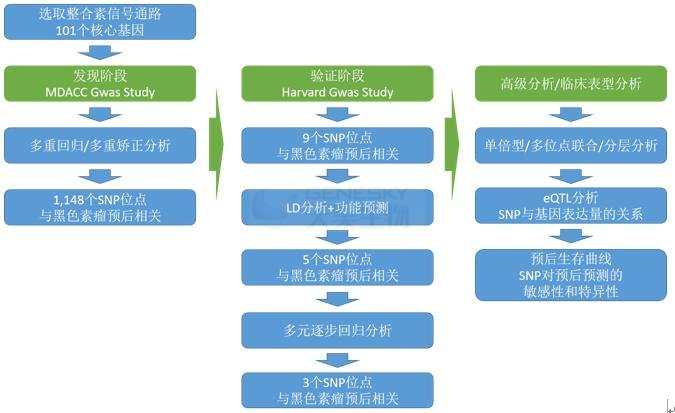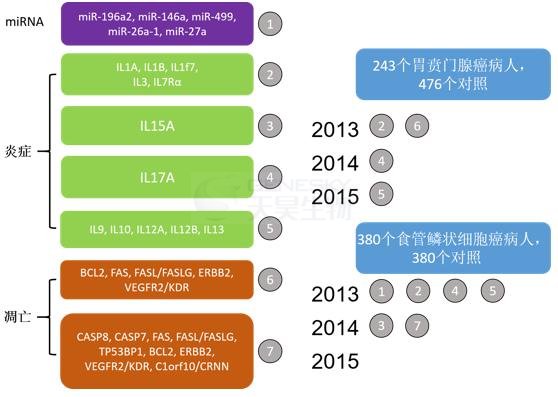癌症SNP这么轻松就发5分的文章?我可能看了篇假的文章……
不做实验,挖掘两个GWAS癌症数据,可以发表5分文章?
我可能看了假的文章……但是同样研究思路的,还不止一篇……
2017年新鲜出炉的文章Genetic variants in the integrin signaling pathway genes predict cutaneous melanoma survival,发表在INTERNATIONAL JOURNAL OF CANCER(IF=5.531)。
这篇文章小编能看出的不同,只有关注了一条pathway,当然还有就是研究的预后生存,不是发病率……
Word天哪,难道就这么简单?这完全不是传统的研究思路啊!小编搜了一下,发现……这样思路的不止一篇!
2016年发表在ONCOTARGET(IF=5.008)上的文章Genetic polymorphisms of Wnt/β-catenin pathway genes are associated with the effiacy and toxicities of radiotherapy in patients with nasopharyngeal carcinoma.
挑选Wnt/β-catenin通路4个核心蛋白CTNNB1(编码β-catenin蛋白),GSK3β,APC,Wnt2的9个SNPs位点。在188个鼻咽癌病人中验证这些SNP位点与放疗效果和毒性的关系。
再搜索了一下,小编发现3年前这样的思路,发表了11分的文章,感觉错过了全世界……
2014年JNCI-JOURNAL OF THE NATIONAL CANCER INSTITUTE杂志(IF=11.37)就发表了这种基于pathway分析进行的SNP关联研究的文章:Insulin-like growth factor pathway genetic polymorphisms, circulating IGF1 and IGFBP3, and prostate cancer survival.
在5,887个胰腺癌病人中,分析类胰岛素生长因子信号通路的26个基因的590个SNP位点与胰腺癌预后生存的相关性。
数据库文献的思路可以复制么?天昊的客户真的做到了!两个癌种血液样品,三个研究领域(miRNA、免疫、代谢和凋亡)客户采用天昊生物自主专利SNP分型技术,三年发表10篇SCI!
PS:上述这些文章给我们展示了一种新的研究思路:
1、打破传统的验证单一基因单一位点的SNP挑选方法,选取一条发挥关键作用的信号通路为研究目标
2、 除了传统的SNP与发病率的关系,任何临床可以量化的指标都可以进行分析,如预后、放化疗不良反应、转移、复发等等。
参考文献:
1、Genetic variants in the integrin signaling pathway genes predict cutaneous melanoma survival. Int J Cancer. 2017 Mar 15; 140(6):1270-1279.
2、Genetic polymorphisms of Wnt/β-catenin pathway genes are associated with the effiacy and toxicities of radiotherapy in patients with nasopharyngeal carcinoma. Oncotarget, 2016, Vol. 7, (No. 50), pp: 82528-82537
3、Insulin-like growth factor pathway genetic polymorphisms, circulating IGF1 and IGFBP3, and prostate cancer survival. J Natl Cancer Inst. 2014 Jun; 106(6):dju085.
4、The variant interleukin 1f7 rs3811047 G>A was associated with a decreased risk of gastric cardiac adenocarcinoma in a Chinese Han population. Tumor Biol. 2013, DOI 10.1007/s13277-013-1463-y.
5、Interleukin 17A rs4711998 A >G polymorphism was associated with a decreased risk of esophageal cancer in a Chinese population. Diseases of the Esophagus (2013), DOI: 10.1111/dote.12045.
6、Interleukin 1B rs16944 G > A polymorphism was associated with a decreased risk of esophageal cancer in a Chinese population. Clinical Biochemistry 46 (2013) 1469–1473.
7、IL-15 receptor alpha rs2228059 A>C polymorphism was associated with a decreased risk of esophageal cancer in a Chinese population. Mol Biol Rep (2014) 41:1951–1957.
8、Interleukin 17A rs3819024 A>G polymorphism is associated with an increased risk of gastric cardia adenocarcinoma in a Chinese population. Biomarkers, 2014; 19(5): 411–416.
9、Interleukin 10 rs1800872 T>G Polymorphism was Associated with an Increased Risk of Esophageal Cancer in a Chinese Population. Asian Pacifi J Cancer Prev, 14 (6), 3443-3447.
10、Interleukin 12B rs3212227 T > G polymorphism was associated with an increased risk of gastric cardiac adenocarcinoma in a Chinese population. Diseases of the Esophagus (2015) 28, 291–298.
11、MiR-196a2 rs11614913 T > C polymorphism and risk of esophageal cancer in a Chinese population. Human Immunology 74 (2013) 1199–1205.
12、Caspase8 rs1035142 G>T polymorphism was associated with an increased risk of esophageal cancer in a Chinese population. Mol Biol Rep (2014) 41:2037–2043.
13、B-cell Lymphoma 2 rs17757541 C>G Polymorphism was Associated with an Increased Risk of Gastric Cardiac Adenocarcinoma in a Chinese Population. Asian Pac J Cancer Prev, 14 (7), 4301-4306.

 咨询热线:400-065-6886
咨询热线:400-065-6886

 咨询热线:400-065-6886
咨询热线:400-065-6886

